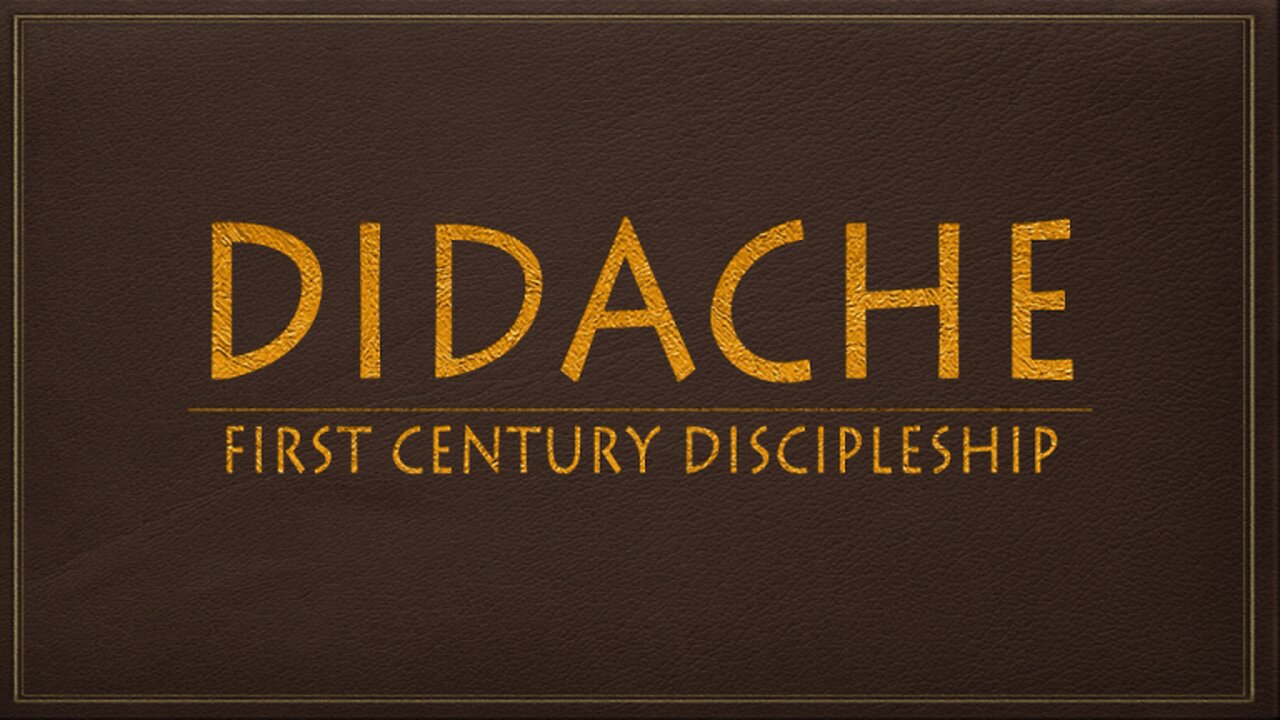Premium Only Content

The Didache "The Lord's Teaching Through the Twelve Apostles to the Nations"
The Didache (/ˈdɪdəkeɪ, -ki/; Greek: Διδαχή, translit. Didakhé, lit. "Teaching"), also known as The Lord's Teaching Through the Twelve Apostles to the Nations (Διδαχὴ Κυρίου διὰ τῶν δώδεκα ἀποστόλων τοῖς ἔθνεσιν), is a brief anonymous early Christian treatise (ancient church order) written in Koine Greek, dated by modern scholars to the first century AD
The first line of this treatise is: "The teaching of the Lord to the Gentiles (or Nations) by the twelve apostles". The text, parts of which constitute the oldest extant written catechism, has three main sections dealing with Christian ethics, rituals such as baptism and Eucharist, and Church organization. The opening chapters describe the virtuous Way of Life and the wicked Way of Death. The Lord's Prayer is included in full. Baptism is by immersion, or by affusion if immersion is not practical. Fasting is ordered for Wednesdays and Fridays. Two primitive Eucharistic prayers are given. Church organization was at an early stage of development. Itinerant apostles and prophets are important, serving as "chief priests" and possibly celebrating the Eucharist; meanwhile, local bishops and deacons also have authority and seem to be taking the place of the itinerant ministry.
The Didache is considered the first example of the genre of Church Orders. It reveals how Jewish Christians saw themselves and how they adapted their practice for Gentile Christians. It is similar in several ways to the Gospel of Matthew, perhaps because both texts originated in similar communities. The opening chapters, which also appear in other early Christian texts like the Epistle of Barnabas, are likely derived from an earlier Jewish source.
The Didache is considered part of the group of second-generation Christian writings known as the Apostolic Fathers. The work was considered by some Church Fathers to be a part of the New Testament, while being rejected by others as spurious or non-canonical. In the end, it was not accepted into the New Testament canon. However, works which draw directly or indirectly from the Didache include the Didascalia Apostolorum, the Apostolic Constitutions and the Ethiopic Didascalia, the latter of which is included in the broader canon of the Ethiopian Orthodox Church.
Lost for centuries, a Greek manuscript of the Didache was rediscovered in 1873 by Philotheos Bryennios, Metropolitan of Nicomedia, in the Codex Hierosolymitanus. A Latin version of the first five chapters was discovered in 1900 by J. Schlecht.
https://www.earlychristianwritings.com/text/didache-roberts.html
-
 58:35
58:35
Trumpet Daily
20 hours ago $3.93 earnedThe Trade War Begins - Trumpet Daily | Feb. 3, 2025
4.73K20 -
 47:03
47:03
Uncommon Sense In Current Times
18 hours agoArrested For Praying Silently in Western Culture and Convicted
3.92K -
 44:19
44:19
PMG
16 hours ago $0.01 earnedIn the wake of a tragedy! Finding hope in broken times
2.52K -
 3:40:50
3:40:50
FreshandFit
9 hours agoGirls Get Exposed As THOTS After Demanding Millionaires?!
102K109 -
 5:30:06
5:30:06
SpartakusLIVE
13 hours ago#1 King of Content kicks off YOUR week with Monday MOTIVATION
128K8 -
 5:56:52
5:56:52
Akademiks
12 hours agoKendrick Lamar Sweeps Grammys. Drake announces new album on Feb 14. Rocky Trial Might get Dismissed?
102K6 -
 3:25:02
3:25:02
BrancoFXDC
9 hours ago $3.40 earnedWarzone Rebirth Rounds
46.1K -
 1:44:14
1:44:14
Glenn Greenwald
16 hours agoRubio's Shift: What is Trump's Foreign Policy? Trump/Musk Attack CIA Fronts USAID & NED: With Mike Benz | SYSTEM UPDATE #401
108K108 -
 1:05:47
1:05:47
Donald Trump Jr.
18 hours agoMexico Sends Troops to Border, Plus USAid Scam Exposed, Live with Brooke Goldstein & Rep Brian Mast | TRIGGERED Ep.213
253K318 -
 9:26
9:26
Rethinking the Dollar
13 hours agoUnbelievable Government Waste: 5 Outrageous Biden-Era Spending Sprees
117K19